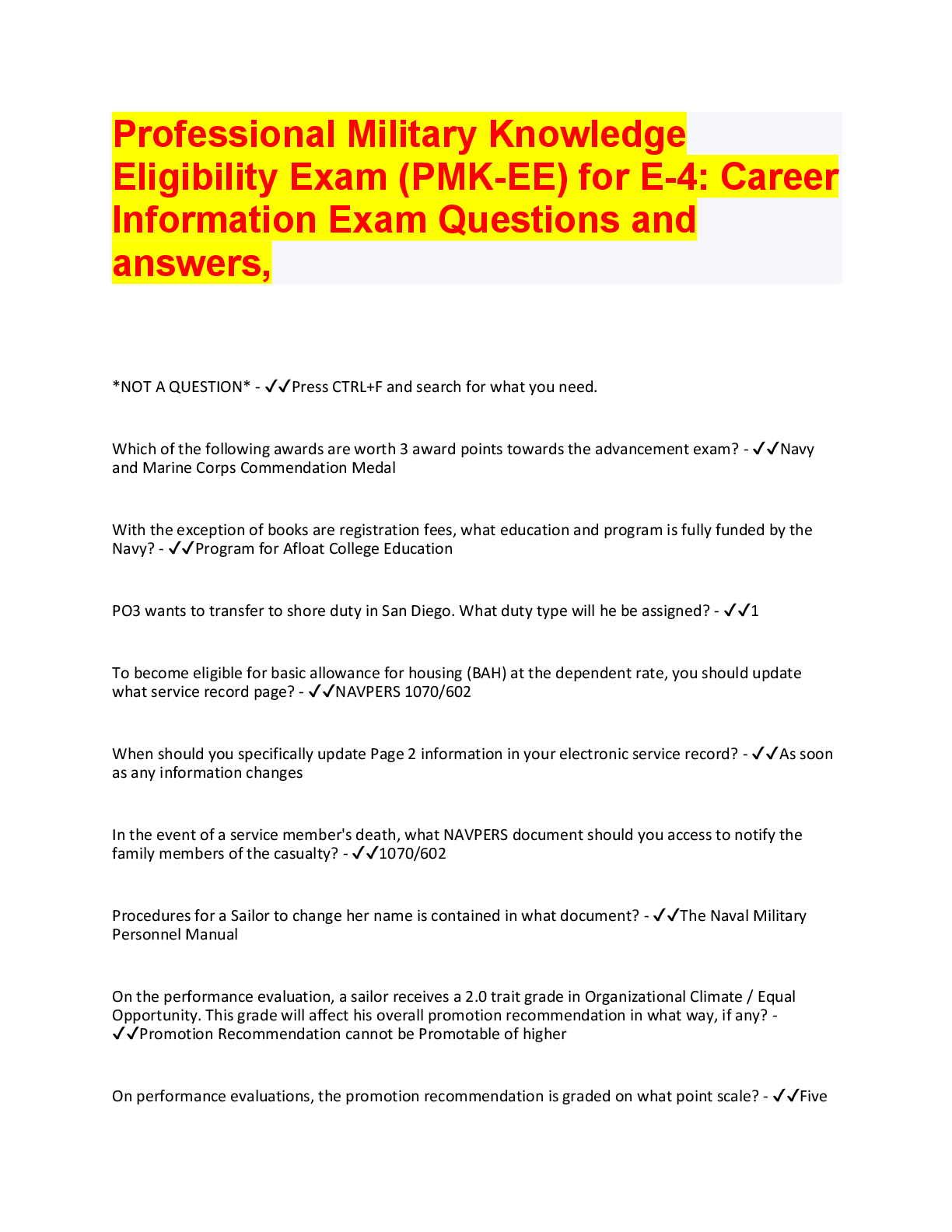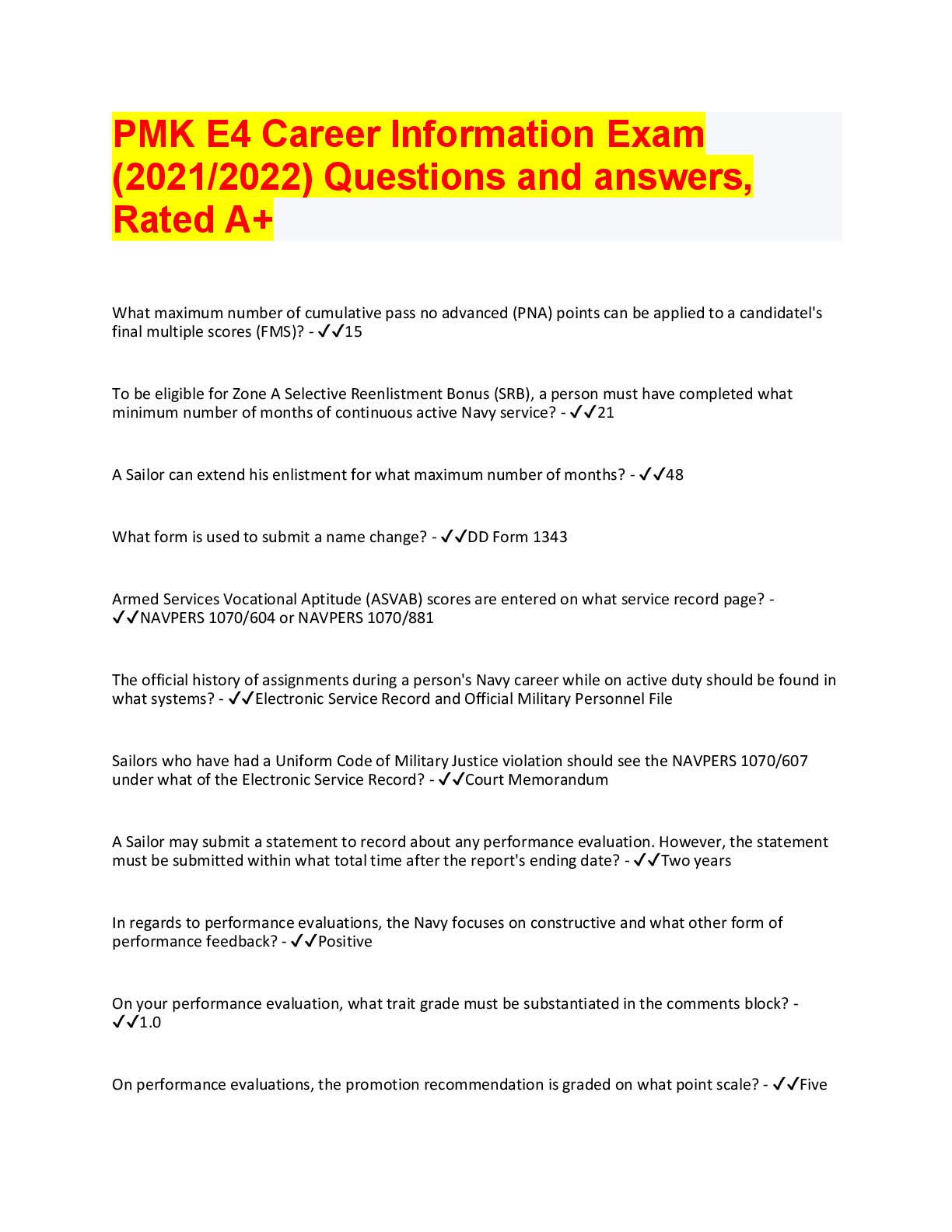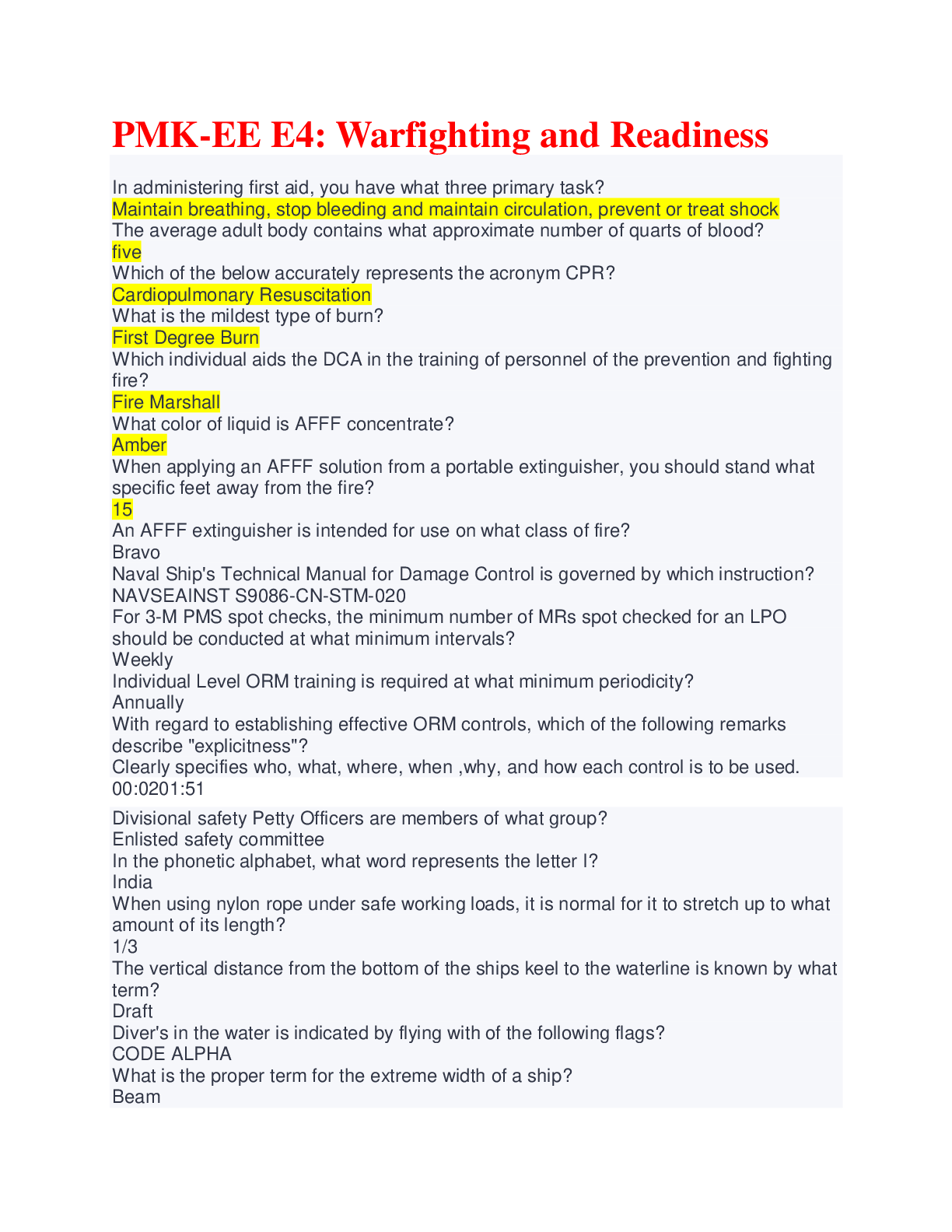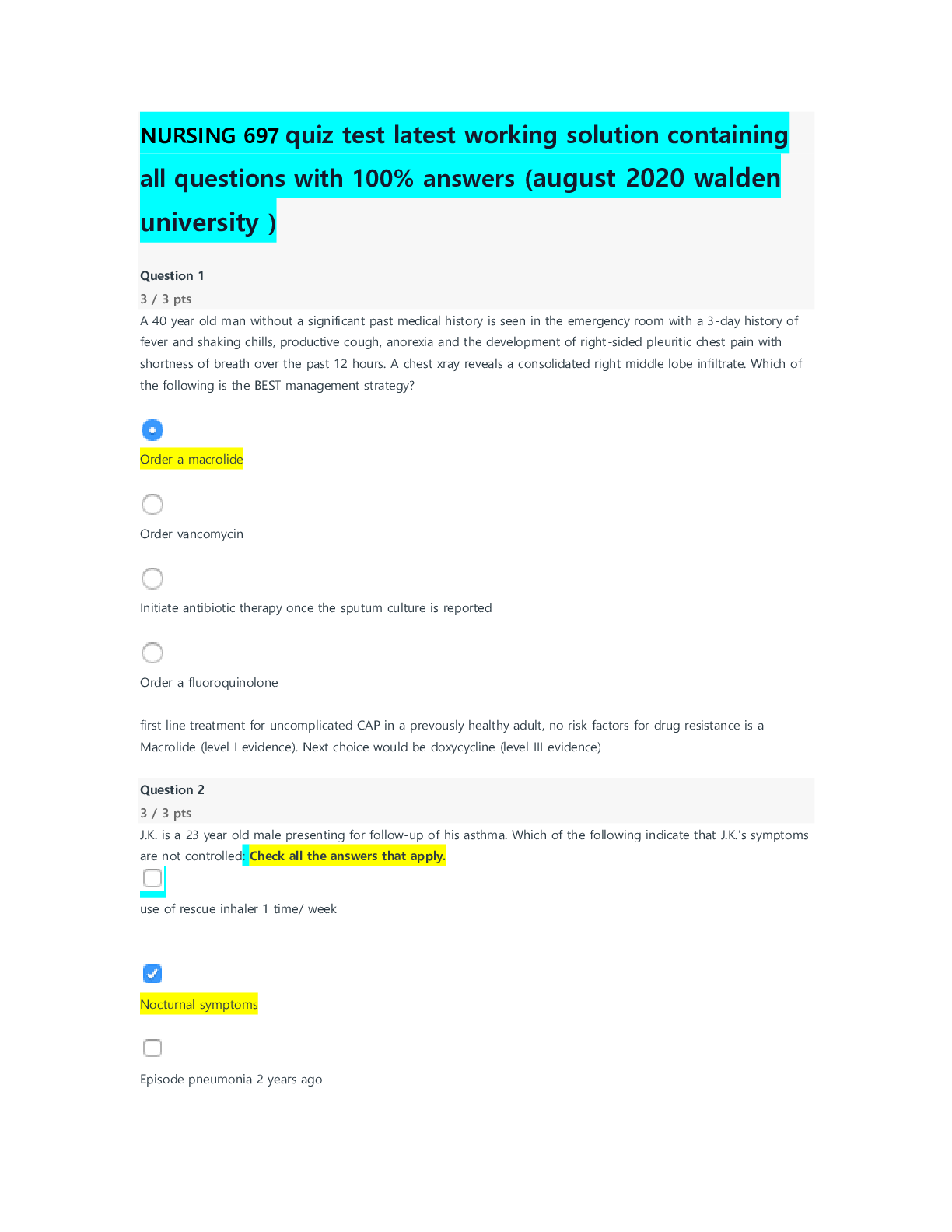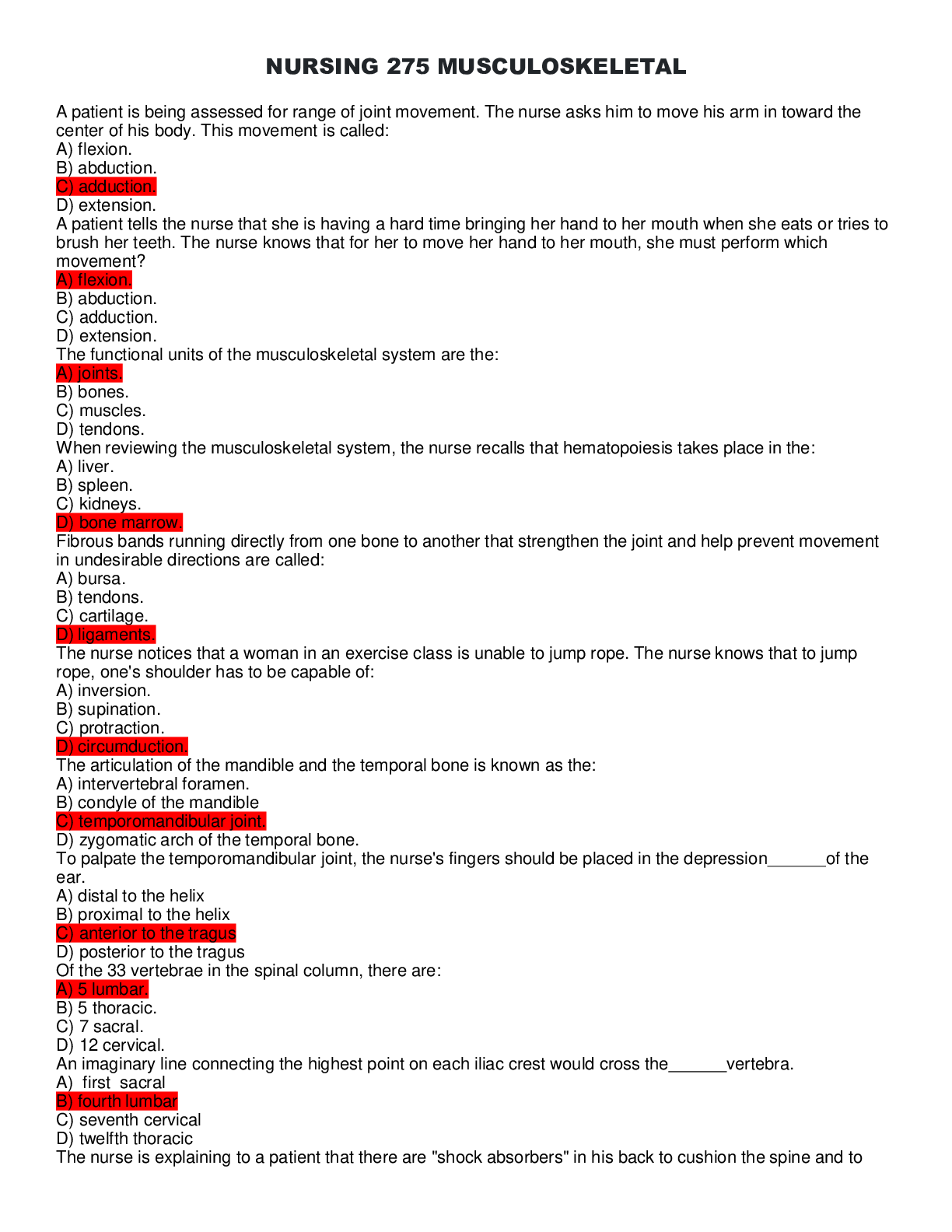*NURSING > QUESTIONS & ANSWERS > NUR 341 ATI RN Mental Health Nursing Book Questions With 100% Accurate Answers (All)
NUR 341 ATI RN Mental Health Nursing Book Questions With 100% Accurate Answers
Document Content and Description Below
1. A charge nurse is discussing mental status examinations with a newly licensed nurse indicates an uderstanding of the teaching? (Select all that apply.) A. "To assess cognitive ability, I should ... ask the client to count backward by sevens." B. "To assess affect, I should observe the client's facial expression." C. "To assess language ability, I should instruct the client to write a sentence." D. "To assess remote memory, I should have the client repeat a list of objects" E. "To assess the client's abstract thinking, I should ask the clietn to identify our most recent presidents." - Ans-A. "To assess cognitive ability, I should ask the client to count backward by sevens." B. "To assess affect, I should observe the client's facial expression." C. "To assess language ability, I should instruct the client to write a sentence." 1. A nurse is planning care for a client who has a mental health disorder. Which of the following actions should the nurse include as a psychobiological intervention? A. Assist the client with systematic desensitization therapy. B. Teach the client appropriate coping mechanisms. C. Assess the cleitn for comorbid health conditions. D. Monitor the client for adverse effects of medications - Ans-D. Monitor the client for adverse effects of medications 1. A nurse in an outpatient mental health clinic is preparing to conduct an initial client interview. When conducting the interview, which of the following actions should the nurse identify as the priority? A. Coordinate holistic care with social services B. Identify the client's perception of their mental health status C. Include the client's family in the interview D. Teach the client about their current mental health disorder. B. Identify the client's perception of their mental health status - Ans-B. Identify the client's perception of their mental health status 1. A nurse is planning a peer group discussion about the DSM-5. Which of the following information is appropriate to include in the discussion? (Select all that apply.) A. The DSM-5 includes client education handouts for mental health disorders. B. The DSM-5 establishes diagnostic criteria for individual mental health disorders. C. The DSM-5 indicates recommended pharmacological treatment for mental health disorders. D. The DSM-5 assists nurses in planning care for client's who have mental health disorders.E. THe DSM-5 indicates expected assess,ent findings of mental health disorders. - Ans-B. The DSM-5 establishes diagnostic criteria for individual mental health disorders. D. The DSM-5 assists nurses in planning care for client's who have mental health disorders. E. THe DSM-5 indicates expected assess,ent findings of mental health disorders. 2. A nurse in an emergency mental health facility is caring for a group of clients. THe nurse should identify which of the following clients requires a temporary emergency admission? A. A client who has schizophrenia with delusions of grandeur B. A client who has manifestations of depression and attempted suicide a year ago C. A client who has borderline personality disorder and assulted a homeless man with a metal rod D. A client who has nipolar disorder and paces quickly around the room while talking to themselves. - Ans-C. A client who has borderline personality disorder and assulted a homeless man with a metal rod 2. A nurse decides to put a client who has a psychotic disorder in seclusion overnight because the unit is very short‑staffed, and the client frequently fights with other clients. This is an example of A. Invasion of privacy. B. False imprisonment C. Assult D. Battery. - Ans-B. False imprisonment 2. A client tells a nurse, "Don't tell anyone, but I hid a sharp knife under my mattress in order to protect myself from my roomate who is always threatening me." Which of the following actions should the nurse take? A. Keep the client's communication confidential, but talk to the client daily using therapeutic communication to convince them to admit to hiding the knife. B. Keep the client's communication confidential, but watch the client and their roomate closely C. Tell the client that this must be reported ti the health care team because it concerns the health and safety of the client and others. D. Report the incident to the health care team, but do not inform the client of the intention to do so - Ans-C. Tell the client that this must be reported ti the health care team because it concerns the health and safety of the client and others. 2. A nurse is caring for a client who is in mechanical restraints. Which of the following statements should the nurse include in the documentation? (Select all that apply.) A. "Client ate most of their breakfast." B. "Client was offered 8 oz of water every hr." C. "Client recieved chlorpromazine 15 mg by mouth at 1000." D. "Client acted out after lunch ." - Ans-B. "Client was offered 8 oz of water every hr." C. "Client recieved chlorpromazine 15 mg by mouth at 1000." D. "Client acted out after lunch ." 2. A nurse hears a newly licensed nurse discussing a client's hallucinations in the hallway with another nurse. Which of the following actions should the nurse take first? A. Notify the nurse manager B. Tell the nurse to stop discussing the behavior C. Provide an in-service program about confidentiality D. Complete an incident report - Ans-B. Tell the nurse to stop discussing the behavior 3. A charge nurse is conducting a class on therapeutic communication with a group of newly licensed nurses. Which of the following aspects of communication should the nurse identify as a component of verbal communication? A. Personal space B. Posture C. Eye contact D. Intonation - Ans-D. Intonation 3. A nurse in an acute mental health facility is communicating with a client. The client states, "I can't sleep. I stay up all night." The nurse responds, "You are having difficulty sleeping?" Which of the following therapeutic communication techniques is the nurse demonstrating? A. Offering general leads B. Summarizing C. Focusing D. Restating - Ans-D. Restating 3. A nurse is communicating with a client who was admitted for treatment of a substance use disorder. Which of the following communication techniques should the nurse identify as a barrier to therapeutic communication? A. Offering advice B. Reflecting C. Listening attentively D. Giving information - Ans-A. Offering advice 3. A nurse caring for a client who has anorexia nervosa. Which of the following examples demonstrates the nurse's use of interpersonal communication? A. The nurse discusses the client's weight loss during a health care team meeting. B. The nurse examines their own personal feelings about clients who have anorexia nervosa C. The nurse asks the client about personal body image perception D. The nurse presents an educational session about anorexia nervosa to a large group of adolescents - Ans-C. The nurse asks the client about personal body image perception 3. A nurse is talking with the caregiver of a child who has demonstrated recent changes in behavior and mood. When the caregiver of the child asks the nurse for reassurance about their child's condition, which of the following responses should the nurse make? A. "I think your child is geterm-17tting better. What have you noticed?" B. ""I'm sure everything will be okay. It just takes time to heal." C. "I'm not sure what's wrong. Have you asked the doctor about your concerns." D. "I understand you're concerned. Let's discuss what concerns you specifically." - Ans-D. "I understand you're concerned. Let's discuss what concerns you specifically." 3. A nurse is talking with the caregiver of a child who has demonstrated recent changes in behavior and mood. When the caregiver of the child asks the nurse for reassurance about their child's condition, which of the following responses should the nurse make? A. "I think your child is getting better. What have you noticed?" B. ""I'm sure everything will be okay. It just takes time to heal." C. "I'm not sure what's wrong. Have you asked the doctor about your concerns." D. "I understand you're concerned. Let's discuss what concerns you specifically." - Ans-D. "I understand you're concerned. Let's discuss what concerns you specifically." 4. A nurse is caring for a client who smokes and has lung cancer. The client reports, "I'm coughing because I have that could that everyone has been getting." The nurse should identify that the client is using which of the following defense mechanisms? A. Reaction formation B. Denial C. Displacement D. Sublimation - Ans-B. Denial 4. A nurse is providing preoperative teaching for a client who was informed of the need for emergency surgery. The client has a respiratory rate 30/min, and says, "This is difficult to comprehend. I feel shacky and nervous." The nurse should identify that the client is experiencing which of the following levels of anxiety? A. Mild B. Moderate C. Severe D. Panic - Ans-B. Moderate [Show More]
Last updated: 2 years ago
Preview 1 out of 34 pages

Buy this document to get the full access instantly
Instant Download Access after purchase
Buy NowInstant download
We Accept:

Reviews( 0 )
$9.00
Can't find what you want? Try our AI powered Search
Document information
Connected school, study & course
About the document
Uploaded On
Jun 17, 2022
Number of pages
34
Written in
Seller

Reviews Received
Additional information
This document has been written for:
Uploaded
Jun 17, 2022
Downloads
0
Views
164




